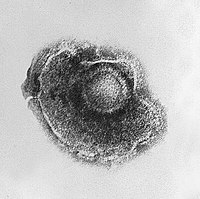
Photo from wikipedia
Varicella zoster virus (VZV) is a pathogenic human herpes virus which causes varicella as a primary infection, following which it becomes latent in peripheral autonomic, sensory, and cranial nerve ganglionic… Click to show full abstract
Varicella zoster virus (VZV) is a pathogenic human herpes virus which causes varicella as a primary infection, following which it becomes latent in peripheral autonomic, sensory, and cranial nerve ganglionic neurons from where it may reactivate after decades to cause herpes zoster. VZV reactivation may also cause a wide spectrum of neurological syndromes, in particular, acute encephalitis and vasculopathy. While there is potentially a large number of coding viral mutations that might predispose certain individuals to VZV infections, in practice, a variety of host factors are the main determinants of VZV infection, both disseminated and specifically affecting the nervous system. Host factors include increasing age with diminished cell-mediated immunity to VZV, several primary immunodeficiency syndromes, secondary immunodeficiency syndromes, and drug-induced immunosuppression. In some cases, the molecular immunological basis underlying the increased risk of VZV infections has been defined, in particular, the role of POL III mutations, but in other cases, the mechanisms have yet to be determined. The role of immunization in immunosuppressed individuals as well as its possible efficacy in preventing both generalized and CNS-specific infections will require further investigation to clarify in such patients.
Journal Title: Journal of Neurovirology
Year Published: 2020
Link to full text (if available)
Share on Social Media: Sign Up to like & get
recommendations!